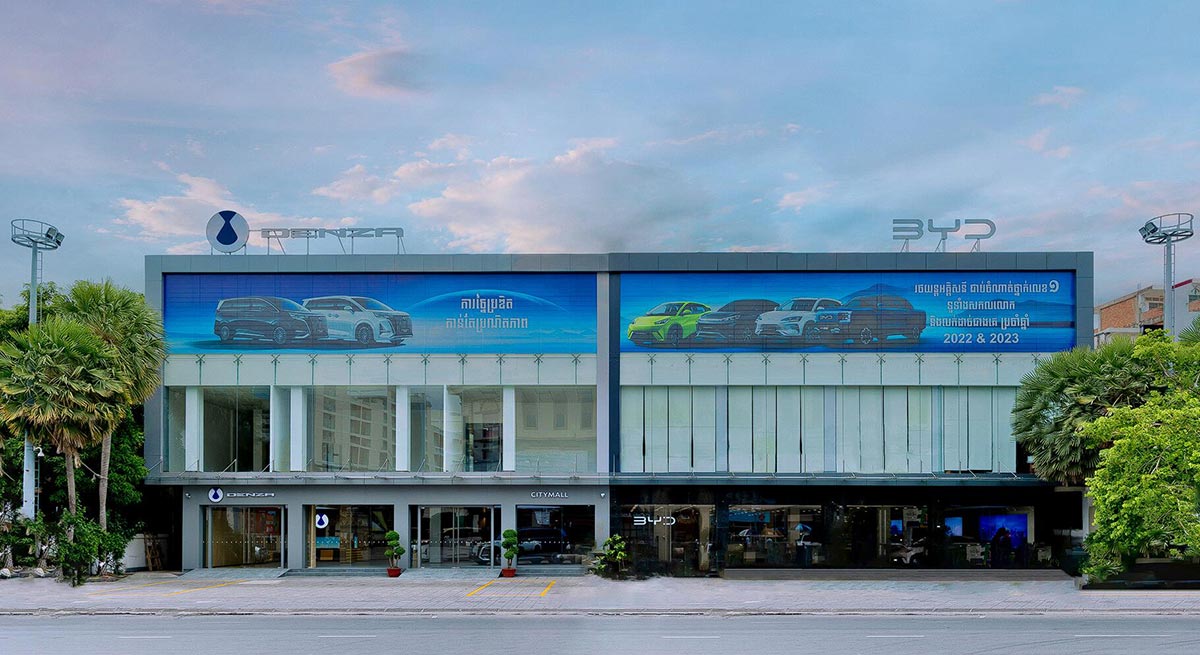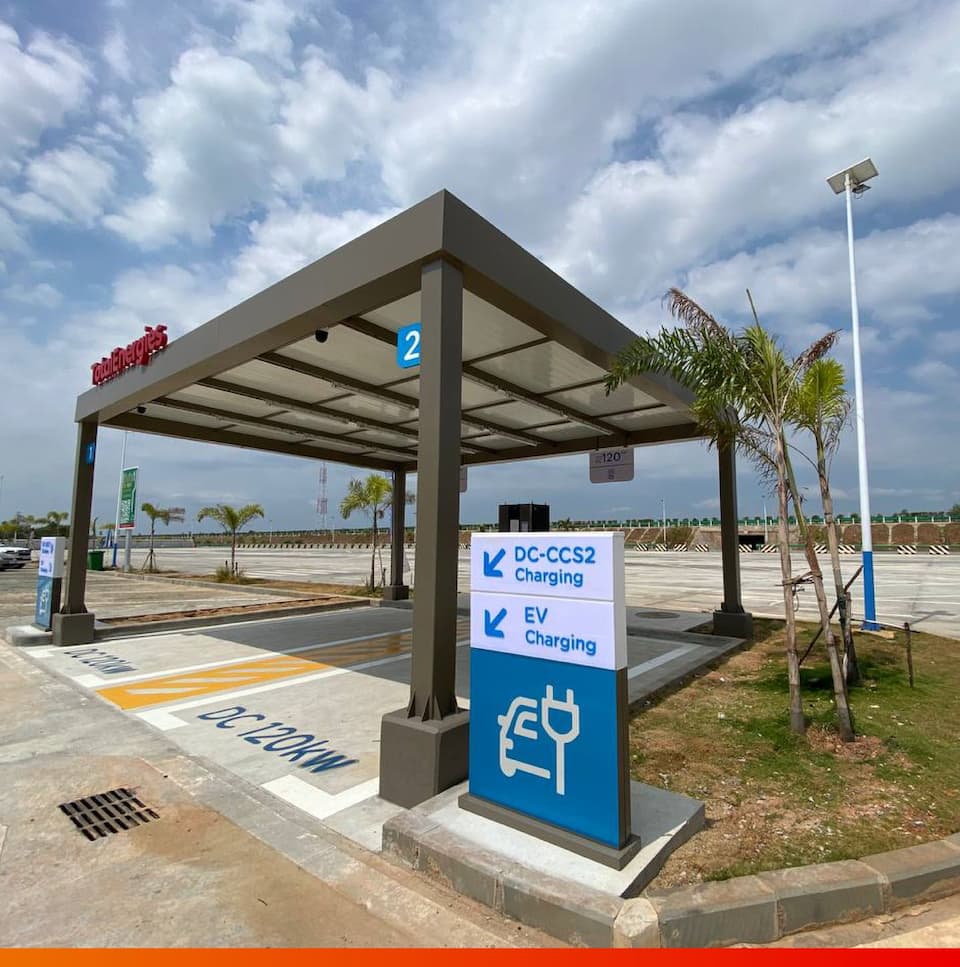BYD Expansion Into Cambodia Is Part Of Its Global Strategy - Kingdom’s EV Targets Are Highly Ambitious

The news that the Chinese EV juggernaut BYD was opening a manufacturing plant in Cambodia was met with some fanfare, they are the leading Electric Vehicle brand globally and made inroads into the developing markets. However, questions remain over when the paint will be built and if Cambodia’s new EV strategy targets are achievable.
According to the Ministry of Public Works and Transport (MPWT), by the end of June 2024, there were 2,968 registered EVs in Cambodia which include 1,614 cars, 440 tuk tuks and 914 motorcycles. At the start of 2024, there were only EV charging stations available at 18 locations across the whole of Cambodia.
The MPWT said that the three most popular EV brands in Cambodia are BYD, Japan's Toyota, and Tesla.
Flagship BYD Showroom - Phnom Penh
BYD entered the Cambodian market in 2020 and opened its first passenger car sales centre in Phnom Penh. The news of the plans to establish a plant coincided with the launch of the latest Denza model In Cambodia at its new Denza Harmony City Mall Showroom flagship showroom which opened in Phnom Penh in mid-July 2024.
Denza was established nearly 15 years ago in 2010 as a joint venture between BYD and Daimler, with each holding a 50 per cent stake at the time, but in 2022, BYD increased its stake in Denza to 90 per cent.
BYD seized the crown in Q4 2023 from Tesla with the most EV sales but the US EV leader regained that title in Q1 2024 and it is expected that the Chinese EV giant will beat Tesla in battery EV sales in 2024. In Q2 2024 alone, the Chinese electric car manufacturer sold nearly one million vehicles.
The BYD showroom in the Cambodian capital covers an area of nearly 600 sqm and features service areas including a vehicle display area, a VIP parlour and a new car delivery area.

This is part of the Chinese EV manufacturer's expansion strategy, added Ye Chenghui, regional director of BYD's Asia Pacific auto sales division, at the opening ceremony.
China continues to hold more than 50 per cent of the market share of global BEV (Battery Electric Vehicle) sales until 2027 and sales are projected to top the combined sales of North America and Europe in 2030, according to Counterpoint.
BYD Cambodian Plant & "Go-Global" Strategy
Cambodia's Prime Minister Hun Manet announced on July 16, 2024, that BYD would establish an EV plant in the Kingdom which would assemble 20,000 vehicles a year for the local market, as well as export vehicles for the international markets. No details were announced as to when the plant will be built.
Considering that current estimates place the number of EV vehicles in Cambodia at under 3,000 it's more than ambitious to sell 20,000 units annually in Cambodia. It's the kind of rhetoric that needs to be read cautiously when these types of investments are announced.
Depending on the political outcome in the USA, Chinese EV manufacturers might see more resistance in the US markets with tariffs and duties, while in Europe, the new tariff rates for Chinese EVs are forcing them to look to developing markets.
Warren Buffett's Berkshire Hathaway was an early investor in BYD (buying shares in 2008) but they have decreased their stake to less than 5 per cent in 2024.
- Within Southeast Asia, BYD opened its first factory in neighbouring Thailand as recently as July 4, 2024, and the Thai facility has an annual capacity of 150,000 vehicles - it is also BYD's first wholly-owned overseas passenger car plant.
- The company has already announced further plans to build a plant in Indonesia too with a USD $1.3 billion plant that will have a capacity of 150,000 vehicles with a groundbreaking ceremony also expected in July. They are hopeful of starting commercial production there by 2026.
- BYD intends to open 100 dealerships in Vietnam within the next three years (by 2026) and is opening ten in July 2024 across the country - in 2023 they announced plans to build a plant in the north of Vietnam.
- BYD also announced plans in July 2024 to build a new manufacturing plant in Turkiye, with its first European factory currently under construction in Hungary

BYD leads the region for EV sales and accounts for more than 25 per cent of sales in the Southeast Asian market with Chinese EV sales growth anticipated to be 25 per cent in 2024 - a combined total of approximately 185 new EV models are set to go on sale in 2024.
Since the news of the BYD plant for Cambodia was announced, it was also alluded to that a Cambodian subsidiary of the Hong Kong-based conglomerate, the Sunwah Group, would be considering investing in electric vehicle (EV) assembly facilities in Cambodia. This was reported following a meeting between representatives from Sun Wah Properties (Cambodia) Co., Ltd. and Nuth Un Vanra, Deputy Secretary General of the Cambodian Investment Committee (CIB) of the Council for the Development of Cambodia (CDC).
The meeting also discussed the installation of EV charging stations (EV Charging Station) which are currently severely lacking to support any growth in the sector in Cambodia, and the government has previously indicated it is looking for private-public partnerships to make this a reality.
Cambodian EV Market & Strategy
There are EVs in Cambodia but the market is small, mainly due to the lack of infrastructure to support the vehicles on a national scale, which has been a recurring criticism halting the growth of the EV market worldwide, which in 2024 has seen a reduction in sales after the hype of recent years.
Despite the number of registered EV vehicles, EV cars and motorcycles saw an increase in H1 2024, but new electric tuk-tuks decreased compared to the same period in 2023.
The Cambodian government has an ambitious target of having 770,000 electric vehicles (EVs) on the roads by 2030, according to the "National Policy on the Development of Electric Vehicles 2024-2030" which was released on July 11, 2024.
The policy document noted, "As the development of the EV sector in Cambodia is in its early stages, building an effective and efficient ecosystem for EVs requires high attention and active participation from relevant ministries and institutions, including the private sector. The focus will be on the supply, installation and distribution of EVs, technology and infrastructure support, especially the construction of power stations, waste management and environmental impact mitigation.”

In 2021, Cambodia reduced import duties on electric vehicles to about 50% lower than taxes on traditional internal combustion engine vehicles.
The policy aims to promote “environmental health, economic growth, energy security, and access to cutting-edge technology” but the numbers in the strategy seem unreal realistic with the targets below proposed by 2030:
- 25,000 EV cars and other light EVs
- 5,000 heavy EVs (such as trucks)
- 720,000 electric motorcycles
- 20,000 electric tuk-tuks
We covered some of this ground earlier in 2024 when the Cambodian government set a target of having 40 per cent of EV cars and 70 per cent of electric motorbikes by 2050 as part of its goals to reduce carbon emissions.
At the time of writing in March 2024, and based on the 2050 targets (and using only current 2024 vehicle registration numbers), Cambodia would need to see an additional 2,800,000 EVs by 2050 which equates to sales of over 190,000 EVs per year by 2050).
Cambodian EV registrations per year (based on government-released data) indicate:
- 2020: 5
- 2021: 63
- 2022: 663
- 2023: 604
- H1 2024:2,968
Surely, nobody is expecting this number to increase by over 768,000 EV vehicles in the next six years to meet the targets set out in the National Policy on the Development of Electric Vehicles 2024-2030 policy.
The initiative of the Royal Government of Cambodia (RGC) to boost both manufacturing opportunities for EV companies in Cambodia, as well as domestic uptake of EVs in coming years is part of its diversification efforts as it tries to pivot away from the traditional pillars of its economy; agriculture, tourism, garment manufacturing, and construction and move the economy towards higher value-added industries.
There does seem to be a healthy demand for EVs in Cambodia according to the Standard Insights 2023 Consumer Report in which Cambodians (94.41%) indicated that the future of automobiles lies in electric vehicles (EVs).
With EV sales slowing there seems to be greater emphasis on taxi fleets adopting EVs as well as robotaxis which are already operating in China and has been a key shift for Tesla too.
However, VinFast Electric Vehicles had planned to enter the Cambodian market in 2023 but the Cambodian Prime Minister effectively publicly blocked the move.